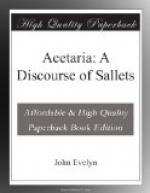49. Pimpernel, Pimpinella; eaten by the French and Italians, is our common Burnet; of so chearing and exhilarating a quality, and so generally commended, as (giving it admittance into all Sallets) ’tis pass’d into a Proverb:
L’Insalata non e buon, ne bella
Ove non e la Pimpinella.
But a fresh sprig in Wine, recommends it to us as its most genuine Element.
50. Purslain, Portulaca; especially the Golden whilst tender, next the Seed-leaves, with the young Stalks, being eminently moist and cooling, quickens Appetite, asswages Thirst, and is very profitable for hot and Bilious Tempers, as well as Sanguine, and generally entertain’d in all our Sallets, mingled with the hotter Herbs: Tis likewise familiarly eaten alone with Oyl and Vinegar; but with moderation, as having been sometimes found to corrupt in the Stomach, which being Pickl’d ’tis not so apt to do. Some eat it cold, after it has been boil’d, which Dr. Muffet would have in Wine, for Nourishment.
The Shrub Halimus, is a sort of Sea-Purslain: The newly peeping Leaves (tho’ rarely us’d) afford a no unpleasant Acidule, even during winter, if it prove not too severe.
Purslain is accus’d for being hurtful to the Teeth, if too much eaten.
51. Radish, Raphanus. Albeit rather Medicinal, than so commendably accompanying our Sallets (wherein they often slice the larger Roots) are much inferior to the young Seedling Leaves and Roots; raised on the [39]Monthly Hot-Bed, almost the whole Year round, affording a very grateful mordacity, and sufficiently attempers the cooler Ingredients: The bigger Roots (so much desir’d) should be such as being transparent, eat short and quick, without stringiness, and not too biting. These are eaten alone with Salt only, as carrying their Peper in them; and were indeed by Dioscorides and Pliny celebrated above all Roots whatsoever; insomuch as in the Delphic Temple, there was Raphanus ex auro dicatus, a Radish of solid Gold; and ’tis said of Moschius, that he wrote a whole Volume in their praise. Notwithstanding all which, I am sure, the great [40]_Hippocrates_ utterly condemns them, as Vitiosoe, innatantes ac aegre concoctiles. And the Naturalist calls it Cibus Illiberalis, fitter for Rustics than Gentlemens Tables. And indeed (besides that they decay the Teeth) experience tells us, that as the Prince of Physicians writes, It is hard of Digestion, Inimicous to the Stomach, causing nauseous Eructations, and sometimes Vomiting, tho’ otherwise Diuretic, and thought to repel the Vapours of Wine, when the Wits were at their genial Club. Dioscorides and [41]_Galen_ differ about their Eating; One prescribes it before Meals, the latter for after. Some macerate the young Roots in warm milk, to render them more Nourishing.




